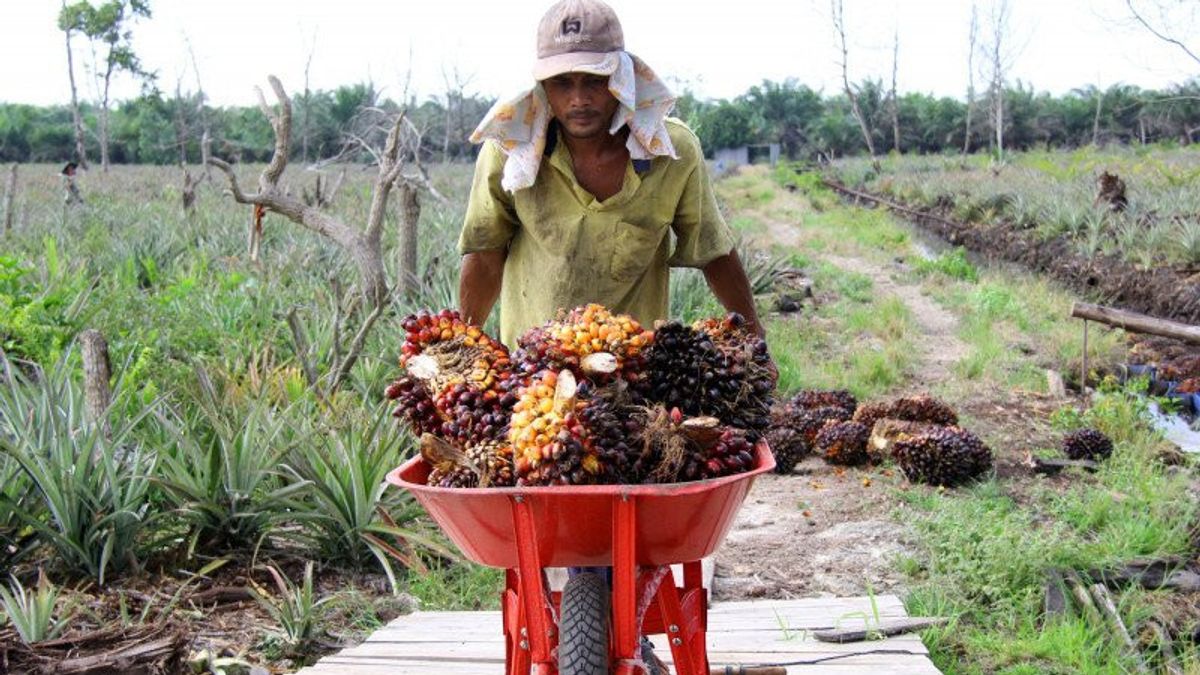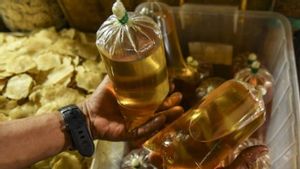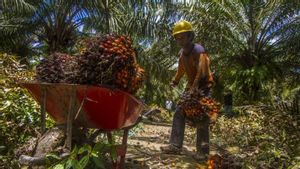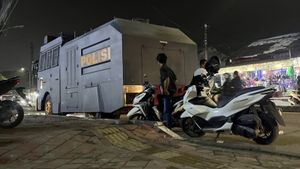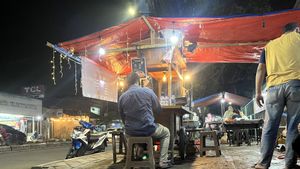JAKARTA - The government's policy regarding the ban on the export of crude palm oil (CPO) caused the Farmer's Exchange Rate (NTP) in May 2022 to plummet by 105.41 or a 2.81 percent decrease compared to the previous month. The CPO export ban policy has been revoked by President Joko Widodo (Jokowi).
Head of the Department of National Strategic Studies of the Central Executive Board (DPP) of the Indonesian Peasant Union (SPI), Mujahid Widian, said the decline in NTP in May 2022 could not be separated from the decline in the NTP of the People's Plantation Subsector.
"The decline in the FTT of plantations, which has been growing steadily so far, is due to the impact of the decline in prices for oil palm Fresh Fruit Bunches (FFB) in various palm oil centers, when the government imposed a policy of banning CPO exports," he said in an official statement, quoted on Tuesday, June 7.
Mujahid said, the decline in National NTP in May 2022 was due to the Price Index Received by Farmers (lt) decreased by 2.37 percent, while the Price Index Paid by Farmers (lb) increased by 0.46 percent.
In addition, continued Mujahid, the decline in FTT in May 2022 was also influenced by the decline in two sub-sectors, namely the FTT in the Food Crops sub-sector (0.32 percent); and the NTP of the People's Plantation sub-sector (9.29 percent). Meanwhile, three other sub-sectors experienced an increase, namely the Horticulture sub-sector (2.75 percent); Livestock subsector (0.77 percent); and Fisheries subsector (0.26 percent).
Referring to the Official Statistical Gazette released by the Central Statistics Agency (BPS) on Thursday, June 2, 2022, there was a decrease in the lt of the People's Plantation Crops subsector by 8.82 percent, while the lb experienced an increase of 0.51 percent.
Meanwhile, said Mujahid, reports from SPI members in several areas such as North Sumatra, Jambi, Riau, and West Sumatra, stated that FFB prices had not returned to normal before the CPO export ban policy.
"Currently the price of FFB at the farmer level varies from IDR 1.600 to IDR 1.800 per kg; at the PKS level it is slightly higher, but in the range of IDR 1.900 to IDR 2.000 per kg. Conditions are becoming increasingly difficult because at the same time Fertilizer prices have experienced a high increase, it can be seen from the production cost index and additional capital. This is burdensome for smallholder plantation farmers," he said.
Another sub-sector that experienced a decline was the Food Crops sub-sector, which fell 0.32 percent compared to the previous month. BPS said that although there was an increase in LT of 0.15 percent, it was still lower than the increase in lb of 0.93 percent.
"If we observe, the FTT of the Food Crops sub-sector has been below the break-even standard for the past 3 months, this is certainly worrying. Especially this May, reports from SPI members in various regions stated that the price of grain (GKP) was relatively stable, and tended to rise. for rice," he explained.
Furthermore, Mujahid said that in several areas such as East Java and Central Java, the weather factor is a scourge. High-intensity rainfall results in many plants being damp and threatened with crop failure.
Meanwhile, the Horticulture sub-sector NTP experienced a significant increase of 2.75 percent, which was due to an increase in lt of 3.23 percent, higher than the increase in lb of 0.46 percent.
VOIR éGALEMENT:
"The increase in the Horticulture sub-sector can be seen from the increase in the price of the chili vegetable group, especially red chili or cayenne pepper. For red chili, the price increase is quite high. For example in Kampar, Riau Province and Kepahiang, Bengkulu Province, prices are in the range of IDR 50.000 to IDR 60.000 per kg. As for the fruit group, information from SPI members in Ogan Ilir, South Sumatra Province, stated that the price of pineapple and watermelon had actually fallen," he said.
Mujahid said that what was observed from the BPS report related to FTT was the increase in the price index paid by farmers or lb. This condition is also related to the global situation, where food and energy prices are increasing. This then had an effect on lt, that farmer's expenditure increased, while income was stagnant or even decreased.
Furthermore, Mujahid assessed that this was in line with the BPS report, where public consumption grew 4.34 percent year on year (yoy) in the first quarter of 2022. At the national level, food price increases have occurred since the beginning of last year. For example in the commodity cooking oil. Not to mention food whose raw materials do not come from within the country, such as flour.
"Reports from SPI farmers in livestock and fisheries this month are under pressure due to the increase in the price of factory feed whose raw materials follow international prices," he said.
The government must take a policy
According to Mujahid, the government must immediately take policies, both short term and long term, to overcome this situation.
"In the short term, the government must ensure how the declining agricultural sub-sectors can rise again. In the context of palm oil, for example, domestic needs must be the main priority so that food prices can be stable," he said.
Moreover, said Mujahid, the increase in the NTP for plantations a few months ago did not guarantee an increase in the incomes of plantation farmers who were members of the SPI. In addition, the government through SOEs can also take on a more central role. Such as managing strategic derivatives of palm oil production, to produce cooking oil or other strategic interests.
"Meanwhile, for the long term, SPI once again emphasizes the urgency of the principles of food sovereignty as the basis of agriculture in Indonesia. This of course must start from the fulfillment of the rights of farmers and other small-scale food producers over production factors, (land and water), access to local seeds, access to markets and financial assistance is fully enjoyed," he said.
The English, Chinese, Japanese, Arabic, and French versions are automatically generated by the AI. So there may still be inaccuracies in translating, please always see Indonesian as our main language. (system supported by DigitalSiber.id)
